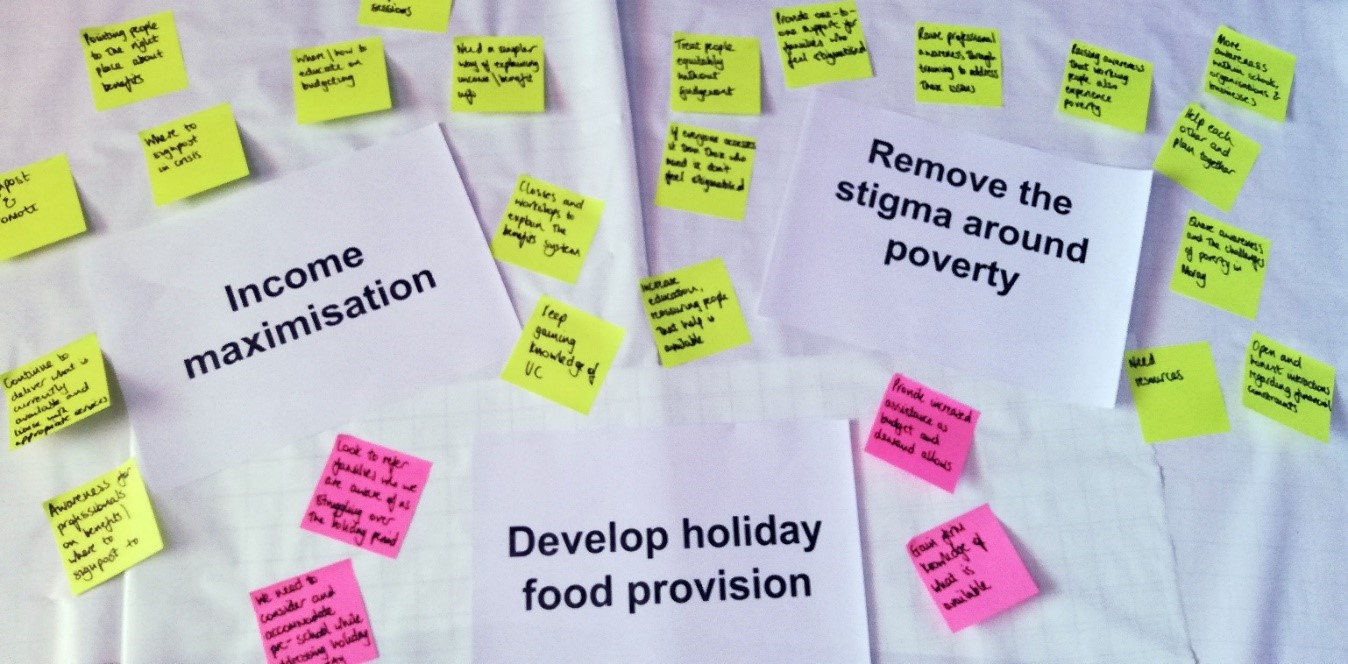 Fairer Moray Forum
Fairer Moray Forum

Six key lessons for building food poverty alliances
Tamanna Chowdhury and Simon Shaw reflect on updates from food poverty alliances supported by Food Power and identify six key lessons for what helps or hinders them.
Make best use of existing networks of support
It’s important for alliances to understand and make best use of existing networks of support as these could prove very helpful in a number of ways including reaching certain community groups. For example, the Jubilee Food Network has teamed up with Idea For All, a user-led charity for disabled adults, to explore and take action on how lived experiences of people living with disabilities and food poverty intersect. In Glasgow, the Interfaith Food Justice Network (IFJN) was able to learn plenty from working with Nourish Scotland and Scottish Food Coalition. As members of the Scottish Food Coalition, IFJN participated in Good Food Nation Bill campaigning, hosted an event with the support of Nourish Scotland (who were also able to jargon-bust the language and mechanisms of government) and submitted a consultation response which reflected people’s lived experience of food insecurity. IFJN has also worked with a range of religious and non-religious community groups in Glasgow, helping the network to reach out to BAME communities. 2,000 people from diverse backgrounds attended their One Big Picnic event, raising awareness of food poverty and promoting unity.
Actively engage partners in alliance actions and activities
It can help to find some specific actions or activities to ensure councils and other partners are actively involved in alliances. Some alliances have faced challenges in successfully engaging the community and/or local council. For example, council engagement on issues such as coordinating holiday food provision or maximising uptake of Healthy Start vouchers varies significantly. However, many alliances acknowledged that it does take time to develop activities and the relationships which develop through them. In Middlesbrough, mapping was undertaken to identify ‘food deserts’ and found that there was an estimated £240,000 of unclaimed benefits in these areas. This led to providing extra advice sessions in wards with high levels of deprivation, alongside pop-up food stalls hosted in primary schools on Fridays, providing access to low-cost food in these areas. In Cardiff, awareness of Healthy Start was initially low, so Food Cardiff developed a training package to support frontline staff to raise awareness and uptake of vouchers, building relationships with key professionals.
Ensure activities are realistic and sustainable
Alliances should reflect on the scope of their alliance’s work to ensure activities are realistic and sustainable. For example the South Wales food poverty alliance decided to prioritise supporting piloting and other development activity in a small number of local authority areas (which included Merthyr, Torfaen and Pembrokeshire) rather than all the areas that are covered by their alliance. However the alliance also have an advocacy action plan to collectively push for positive change based on the nine recommendations in the alliance’s Call to Action report which mapped food insecurity across their region.
Offer services in an empowering and non-stigmatising way
It continues to be important to offer local services in an empowering and non-stigmatising way. In Cambridge interviews with people with lived experience led the alliance to partner with the city council to develop a more participatory model for holiday lunch delivery. By rebranding holiday lunches as “Fun, Food and Action” and by introducing prep sessions to allow families to participate in the lunches and offering time credits, they hoped to remove the stigma of a ‘handout’ and foster relationships, participation and action in the local community. In Shropshire, the Shropshire Larder website brings together essential information for people living on low incomes in Shropshire; the alliance consulted people with lived experience to minimise any stigma in how the information is presented. In Newcastle, experts by experience guide the work of the alliance and inform local decisions.
Recognise and respond to rural food poverty
Rural food poverty must be recognised and responded to in a targeted way. Alliances located in rural areas have told us about the challenges they face trying to tackle rural poverty; they noted that rural poverty is often overlooked. This usually results in the scarcity of food poverty data in rural areas. In response, a number of alliances have built the evidence base. The Fairer Moray Forum carried out a shopping basket comparison which showed that people in rural areas were paying more than twice the amount of those not in rural areas. In Shropshire the alliance is now working closely with CREST at the University Centre, Shrewsbury and has created an interactive map of food poverty indicators in Shropshire.
Sustainable funding remains a major issue
Initial funding can help alliances to seek more sustainable funding but this remains a major issue for those responding to food poverty. Most alliances are positive about the financial support they have received from Food Power, but they are now trying to seek alternative funding routes to sustain their local alliance and its work. Some alliances have reported how the Food Power supported activity has led to statutory agencies and/or other funders supporting alliances to continue their work.
Find out more about Food Power and the work of food poverty alliances.
Food Power: Food Power is an exciting new programme working with local communities across the UK to strengthen their ability to reduce food poverty.
Sustain
The Green House
244-254 Cambridge Heath Road
London E2 9DA
020 3559 6777
sustain@sustainweb.org
Sustain advocates food and agriculture policies and practices that enhance the health and welfare of people and animals, improve the working and living environment, promote equity and enrich society and culture.
© Sustain 2026
Registered charity (no. 1018643)
Data privacy & cookies
Icons by Icons8







